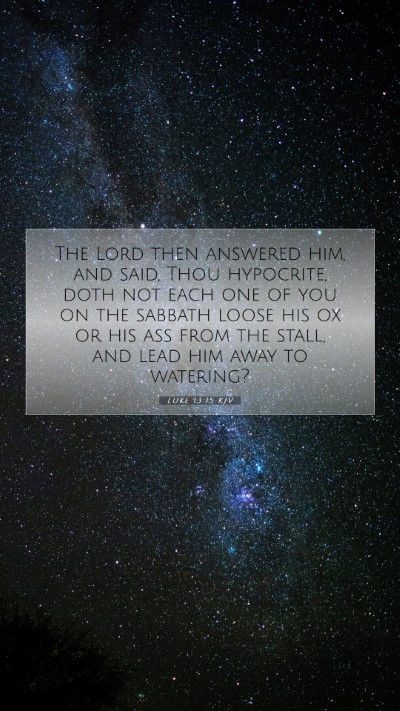Understanding Luke 13:15
In the Gospel of Luke, Chapter 13, Verse 15, we encounter a profound moment where Jesus responds to the criticism He faces for healing on the Sabbath. This verse provides rich insights into divine compassion versus legalistic traditions. Below, we summarize the interpretations and meanings derived from esteemed public domain commentaries.
Verse Text
"The Lord then answered him and said, 'You hypocrite! Does not each of you on the Sabbath untie his ox or his donkey from the manger, and lead it away to water it?'" (Luke 13:15, ESV)
Commentary Insights
-
Matthew Henry's Commentary:
Henry emphasizes the hypocrisy of the Pharisees, pointing out that their strict observance of the Sabbath was inconsistent with their actions. He illustrates the importance of compassion over ritualistic adherence to the law, noting that if one cares for their animals' needs, how much more should they care for a human's well-being. This reflects the heart of God's law, which prioritizes mercy and love.
-
Albert Barnes' Notes:
Barnes highlights the significance of Jesus' question, which challenges the Pharisees to reconsider their priorities. He draws attention to how the Jews allowed for work that benefited their economic interests while condemning acts of kindness and mercy. This contradiction illustrates the need for a deeper understanding of the true purpose of the Sabbath rest, which is not mere abstention from work but an invitation to engage in good.
-
Adam Clarke's Commentary:
Clarke discusses the cultural context of the Sabbath laws and their interpretations at the time. He explains that the Pharisees were quick to condemn any deviation from their understanding of the law while conveniently overlooking their own allowances for personal benefit. Clarke suggests that this behavior serves as a caution against a rigid adherence to tradition that disregards human need and divine compassion.
Key Themes and Messages
- Hypocrisy: The verse underscores the theme of hypocrisy, as those who criticized Jesus failed to recognize their own inconsistency in adhering to the law.
- Compassion: Jesus teaches that acts of mercy are not only permissible but are essential, even on the Sabbath. This confirms His mission to highlight love over ritual.
- Intent of the Law: The discourse emphasizes understanding the law's intent, which is rooted in love and serves humanity rather than constraining it.
Application of the Verse
For those seeking Bible study insights, Luke 13:15 serves as a reminder to evaluate our motivations and practices in light of Christ’s teachings. It challenges individuals to reflect on how often our traditions may hinder acts of kindness. This reflection is crucial for anyone exploring how to interpret Bible verses.
Related Verses
- Mark 2:27: "And he said to them, 'The Sabbath was made for man, not man for the Sabbath.'"
- Matthew 12:11-12: "He said to them, 'Which of you, if you have a sheep and it falls into a pit on the Sabbath, will not take hold of it and lift it out? How much more valuable is a person than a sheep!'"
- Galatians 5:14: "For the entire law is fulfilled in keeping this one command: 'Love your neighbor as yourself.'
Conclusion
In summary, Luke 13:15 encapsulates the clash between divine compassion and rigid legalistic traditions. By understanding this scripture through Bible verse explanations and study, believers can appreciate the deeper meanings behind Jesus' actions and apply these lessons to their daily lives. This verse calls for a transformative approach in our relationship with both God and others, urging a shift from mere compliance to genuine love.


